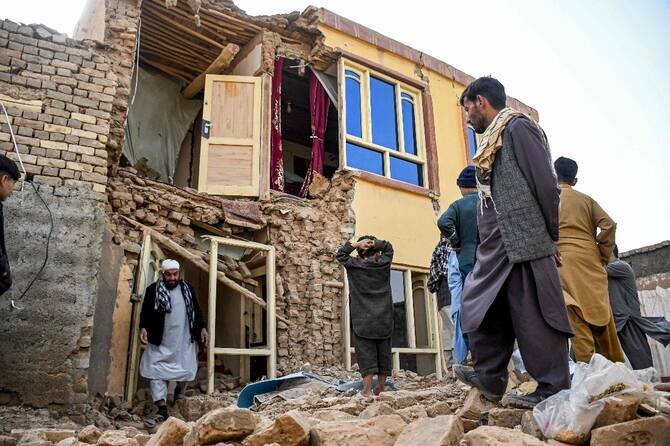
Afghanistan Earthquake Survivors Face Cold and Rain Amid Rubble
A powerful earthquake in northern Afghanistan has left survivors dealing with cold temperatures and rain as they attempt to recover belongings from the rubble.
Kabul: Survivors of a powerful earthquake in northern Afghanistan that killed more than 25 people and injured nearly 1,000 were digging through the rubble of their homes on Tuesday, trying to salvage what belongings they could after spending the night outside in the bitter cold.
Rain was forecast for the region, further compounding the misery for survivors.
The 6.3 magnitude quake struck just before 1 a.m. local time on Monday, with an epicenter 22 kilometers west-southwest of the town of Khulm in Samangan province.
By early Tuesday afternoon, the death toll stood at 27, while another 956 people were injured, according to Public Health Ministry spokesperson Sharafat Zaman.
The tremor also damaged historical sites, including Afghanistan's famed Blue Mosque in the northern city of Mazar-e-Sharif and the Bagh-e-Jahan Nama Palace in Khulm.
The Blue Mosque's minaret was badly damaged, with bricks and tiles falling from its walls and cracks appearing elsewhere.
Video footage showed significant damage to parts of the mosque, with decorative tiles scattered on the ground.
The 19th-century Bagh-e Jehan Nama Palace also sustained severe damage, including a collapsed tower and widespread cracking.
The palace's restoration is deemed urgent due to the approaching winter and expected rain.
In Khulm, aftershocks caused continued fear among survivors who spent the night outdoors in cold weather.
Residents expressed concern about potential future earthquakes and the difficulties faced by women and children without access to basic necessities or shelter.
Rescue crews were still operating on Tuesday, with efforts expected to be completed by day's end.
The World Health Organization reported partial damage at several health facilities, including the collapse of a laboratory at Samangan Provincial Hospital.
Emergency response operations continue, involving health teams and rescue units.
Afghanistan often struggles in responding to natural disasters due to its impoverished state, particularly in remote areas where buildings are often poorly constructed.
In August, a quake in eastern Afghanistan killed over 2,200 people.
Rain was forecast for the region, further compounding the misery for survivors.
The 6.3 magnitude quake struck just before 1 a.m. local time on Monday, with an epicenter 22 kilometers west-southwest of the town of Khulm in Samangan province.
By early Tuesday afternoon, the death toll stood at 27, while another 956 people were injured, according to Public Health Ministry spokesperson Sharafat Zaman.
The tremor also damaged historical sites, including Afghanistan's famed Blue Mosque in the northern city of Mazar-e-Sharif and the Bagh-e-Jahan Nama Palace in Khulm.
The Blue Mosque's minaret was badly damaged, with bricks and tiles falling from its walls and cracks appearing elsewhere.
Video footage showed significant damage to parts of the mosque, with decorative tiles scattered on the ground.
The 19th-century Bagh-e Jehan Nama Palace also sustained severe damage, including a collapsed tower and widespread cracking.
The palace's restoration is deemed urgent due to the approaching winter and expected rain.
In Khulm, aftershocks caused continued fear among survivors who spent the night outdoors in cold weather.
Residents expressed concern about potential future earthquakes and the difficulties faced by women and children without access to basic necessities or shelter.
Rescue crews were still operating on Tuesday, with efforts expected to be completed by day's end.
The World Health Organization reported partial damage at several health facilities, including the collapse of a laboratory at Samangan Provincial Hospital.
Emergency response operations continue, involving health teams and rescue units.
Afghanistan often struggles in responding to natural disasters due to its impoverished state, particularly in remote areas where buildings are often poorly constructed.
In August, a quake in eastern Afghanistan killed over 2,200 people.